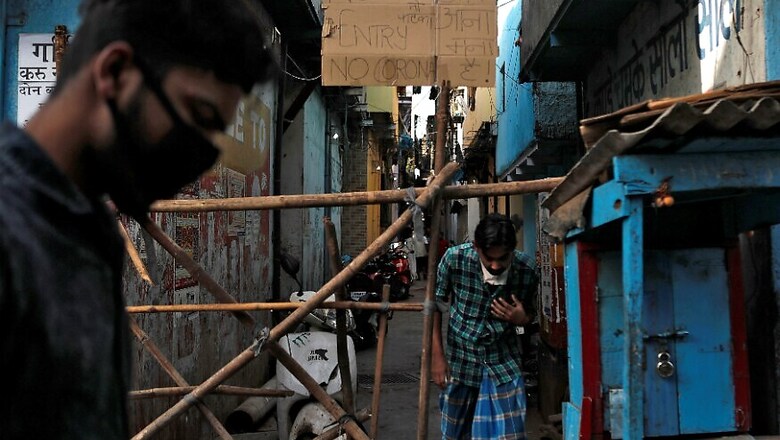
views
The World Health Organization (WHO) on Friday acknowledged the success of the steps followed in Mumbai's Dharavi to contain the coronavirus, saying community engagement and testing is key to breaking the chain of transmission of the disease.
Dharavi, one of the largest slums in Asia, on Friday reported 12 new cases, taking its tally to 2,359. Dharavi currently has 166 active cases and 1,952 patients have been discharged from hospitals following recovery so far.
WHO chief Tedros Adhanom Ghebreyesus said the examples of Italy, Spain, South Korea and India's biggest slum showed that however bad a outbreak was, the virus could still be reined in through aggressive action.
"In the last six weeks cases have more than doubled," Tedros told a virtual press conference in Geneva.
However, "there are many examples from around the world that have shown that even if the outbreak is very intense, it can still be brought back under control," said Tedros.
"And some of these examples are Italy, Spain and South Korea, and even in Dharavi -- a densely packed area in the megacity of Mumbai -- a strong focus on community engagement and the basics of testing, tracing, isolating and treating all those that are sick is key to breaking the chains of transmission and suppressing the virus."
Shiv Sena leader Aaditya Thackeray described the WHO chief's remarks as "huge for our very own Dharavi that has chased the virus". He urged the state government, BMC, NGOs and other representatives to keep following the path to success.
This is huge for our very own Dharavi that has chased the virus. State Govt and @mybmc teams, along with NGOs, Elected Representatives and most importantly, Dharavikars! Let’s keep this going! Thank you @WHO for recognising their efforts, and will keep going on https://t.co/RSVGILaoLo— Aaditya Thackeray (@AUThackeray) July 10, 2020
The Maharashtra government and the Municipal Corporation of Greater Mumbai had earlier received praise from the Centre for the steep decline in the number of COVID-19 cases in Dharavi.
The Additional Municipal Commissioner of the region, Kiran Dighavkar, has credited effective screening and a proactive approach for the feat.
The Centre had lauded the approach of tracing, tracking, testing and treating by the state government and municipal authorities.
"To tackle the issue of manpower to carry out proactive screening in high risk zones, BMC forged strategic public private partnerships in containment measures and all available ‘private’ practitioners were mobilised. BMC provided the private doctors with PPE kits, thermal scanners, pulse oxymeters, masks and gloves and started door-to-door screening in high risk zones and all suspects were identified," the Centre had said.
"BMC encouraged all practitioners to open their clinics to attend to the patients and communicate to BMC in case any COVID1-9 suspects were found. BMC sanitised the clinics of the private practitioners and provided them all necessary support. To augment health infrastructure in the city, all private hospitals were brought onboard and acquired for treatment," it added.
The novel coronavirus has killed at least 5,55,000 people worldwide since the outbreak emerged in China last December. Nearly 12.3 million cases have been registered in 196 countries and territories.
"Across all walks of life, we are all being tested to the limit," Tedros said, "from countries where there is exponential growth, to places that are loosening restrictions and now starting to see cases rise. "Only aggressive action combined with national unity and global solidarity can turn this pandemic around."
(With inputs from AFP)
















Comments
0 comment